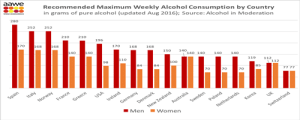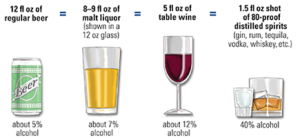A Canadian study has suggested that low-risk drinkers may still be at risk from health issues.
Do you consider yourself to be one of the low-risk drinkers? How many times, when enjoying a drink, have you decided to have another? One more than you planned? We’ve all been there, ‘just one for the road.’ What harm could it do? Especially when sticking to the government’s health guidelines over how much you drink should in a week. Unfortunately, research from overseas suggests, even if you are a moderate drinker, you could still be at risk of serious health problems related to alcohol.
Moderate drinking still poses a risk
Many people believe if they do not drink more than the government advises they have nothing to worry about. If they keep it down to 14 units a week everything will be fine. However, some scientists are now saying that, even if you limit your drinking, you could still be in danger of alcohol-related injuries or illness. These could possibly have serious consequences such as hospitalisation, cancer and even early death. This is becoming more serious amidst fears that over-consumption may become the new normal.
A study in Canada concluded that people may not be protected from the health consequences of drinking even if consuming at a moderate level. The research revealed half of cancer deaths linked to alcohol in the western province of British Columbia were thought to be low-risk drinkers. Scientists also state around two in five alcohol fatalities were people who consumed below the recommended weekly levels. Others were often former alcoholics who had relapsed.
Call for reduced limits
Experts in Canada have now called for nations across the globe to bring in stricter guidelines concerning alcohol. Many commentators have suggesting the UK follow suit.The British government consider moderate or low risk drinkers to be consuming no more than six pints of moderate strength beer a week. In Canada, this is nine pints.

Countries have been advised to follow Holland’s lead. Here the population is either discouraged from drinking at all or to restrict their intake to one a day.
Ironically enough, for a country often associated with partying, The Netherlands has among the most stringent recommended alcohol limits in the world. This is despite tourists and stag nights flocking to Amsterdam every year. Dutch authorities advise only consumption of no more than five and a half pints in a week. They also recommend foregoing alcohol altogether.
Low-Risk Drinkers urged to cut down further
A health researcher at the University of Victoria, in British Columbia, agrees with the Dutch. Dr Adam Sherk feels that, when it comes to drinking, you should show caution. He advises limiting yourself to no more than one beer or glass of wine per day. During their research, the Canadian scientists employed an open access model known as the ‘International Model of Alcohol Harms and Policies’ or ‘Intermorph’. This studies the accidents, injuries or health problems linked to alcohol on a local or national scale. Social types or demographics which may be affected are also taken into account.
The study appeared in The Journal of Studies on Alcohol & Drugs. It concentrated on the public’s consumption of alcohol, and how much they drank six years ago. Researchers examined evidence from three separate sources… Facts and figures on hospital care, provided by the Canadian Institute for Health Information; the mortality rate from Statistics Canada and a survey on substance abuse problems.
Alcohol can be hazardous even at low levels
The Canadian government considerers moderate drinking to be a maximum of fifteen drinks a week for males and ten for females. One drink is the equivalent of 5 ounces of wine (small glass), 1.5 (2 small measures) ounces of hard liquor or 12 ounces of beer (three quarters of a pint). Researchers have used this study to illustrate how alcohol can be hazardous to your health, even for those considered low-risk drinkers. It has lead to calls for weekly drinking limits to be tightened around the world.

You may tell yourself you don’t consume more than 14 units a week and that it’s just a harmless drink. However, scientists in Canada may make you question how harmless it really is, and whether you should have that one more for the road.


